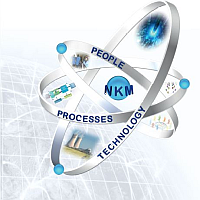The conference will consist of both plenary and parallel sessions, blending high-level, keynote sessions (which will address strategic and cross-cutting aspects of KM) with more practical sessions (which will include experience sharing through case studies of practices in, and approaches to, KM systems and techniques). Plenary sessions will be ongoing throughout the week and during parallel sessions only two tracks are planned to be held simultaneously. The event will feature exhibitions, forums and panels, as well as tutorials and workshops.
The scope of the conference will be articulated through thematic tracks, exploring both cross-cutting aspects of nuclear KM and elements that are more prominent in, and specific to, distinct applications of nuclear power and technology. The planned thematic tracks are listed below and additional details can be found in the Abstract and Call for Papers.
-
Track 1: Strategic and cross-cutting KM issues in organizations
Strat-Org<div style="text-align: justify; font-family: verdana; font-size: 8pt;"> • Organizational benefits of managing knowledge
• Consequences of failures to manage organizational knowledge
• Optimization of knowledge-intensive decision processes
• Managing essential knowledge as a strategic organizational asset
• Organizational learning, building and sustaining core competencies
• Knowledge transfer: including intergenerational and interorganizational; across different sectors, life-cycle stages; and projects
• Developing competent workers through education and training, mentoring and apprenticeships
• KM methodologies, tools, approaches and practices to support knowledge processes, including information technology
• Knowledge sharing, including dissemination of good practices and knowledge networks
• Development of KM capability and culture
• Organizational culture
• Embedding KM in an organization’s performance management system
• KM governance, policy, implementation, and sustainability considerations
</div> -
Track 2: Managing knowledge for new build projects and programmes in newcomer and expanding countries
N-build<div style="text-align: justify; font-family: verdana; font-size: 8pt;"> • Management of design knowledge
• Knowledge transfer between the vendor and the operator
• Licensing competencies
• Owner/operator competencies
• Role of research reactors in managing knowledge building for new build programmes in newcomer and expanding countries
Note: many cross-cutting topics under Thematic Track 1 may also be relevant here</div> -
Track 3: Managing knowledge for operating nuclear facilities
Op<div style="text-align: justify; font-family: verdana; font-size: 8pt;"> • KM integration into the management system
• KM in support of plant configuration management
• KM aspects of plant life management and long term operation
Note: many cross-cutting topics under Thematic Track 1 may also be relevant under this Track, in particular to the following:
• Transfer and organization of knowledge/information from early stages of the nuclear project
• Managing external knowledge dependencies such as reliance on the competencies of outsourced services, contractors, owners group support and vendor support</div> -
Track 4: Managing knowledge for decommissioning, environmental remediation and radioactive waste management projects, including in countries with phase-out plans
D&ER<div style="text-align: justify; font-family: verdana; font-size: 8pt;">• Transfer of knowledge from operations to decommissioning
• Long-term knowledge retention and archiving
• Knowledge requirements for the establishment of a management system to support decommissioning, environmental remediation and radioactive waste management
• Lessons learned and knowledge transfer from decommissioning experiences to apply in the optimization of designs for new build
• Strategic KM issues in phase-out countries
Note: many cross-cutting topics under Thematic Track 1 may also be relevant here.</div> -
Track 5: KM for nuclear regulatory compliance
Reg<div style="text-align: justify; font-family: verdana; font-size: 8pt;">• Managing regulatory knowledge: regulatory competence models, assessment of needs
• KM for regulatory authorities and Technical Support Organizations
• Oversight of licensee knowledge programs
• Licensing competencies for the different phases of the facility life cycle
• Ensuring a competent workforce and retaining personnel in a competitive market
• KM issues in safety assessment and periodic safety reviews
Note: many cross-cutting topics under Thematic Track 1 may also be relevant here.</div> -
Track 6: KM for non-power nuclear science and applications
S & Ap<div style="text-align: justify; font-family: verdana; font-size: 8pt;">• KM in food and agriculture applications
• KM in human health applications
• KM in environment applications
• KM in water resources applications
• KM in radioisotope production and radiation technology applications
• KM in nuclear science
• Role of research reactors in knowledge development for non-power nuclear science and applications
Note: many cross-cutting topics under Thematic Track 1 may also be relevant here.</div> -
Track 7: KM in nuclear technology research, development and innovation
R-D&I<div style="text-align: justify; font-family: verdana; font-size: 8pt;">• Intellectual property management
• Managing the innovation and commercialization process for new technological systems
• Methodologies for predictive modelling and forecasting future benefits of research and development (R&D) and innovation
• Managing knowledge in non-electrical applications of nuclear power
• R&D knowledge acquisition and transfer from other sectors
• Managing knowledge in/for global R&D initiatives
• Managing knowledge verification and validation processes in R&D
• Managing the integration of new innovations and technologies into existing technology systems (incremental innovation)</div> -
Track 8: Issues and approaches for information, records and data management
I&R Mngmt<div style="text-align: justify; font-family: verdana; font-size: 8pt;">• Knowledge organization systems, glossaries, repositories, data-mining, managing information archives, unstructured data
• Content management and semantic search technologies
• Metadata, thesauri, ontologies, taxonomies, knowledge mapping and graphs
• Information services and discovery
• Information dissemination
• Open source and data interchange standards
• Nuclear data, integral experiments and computer-code repositories and preservation initiatives</div>

